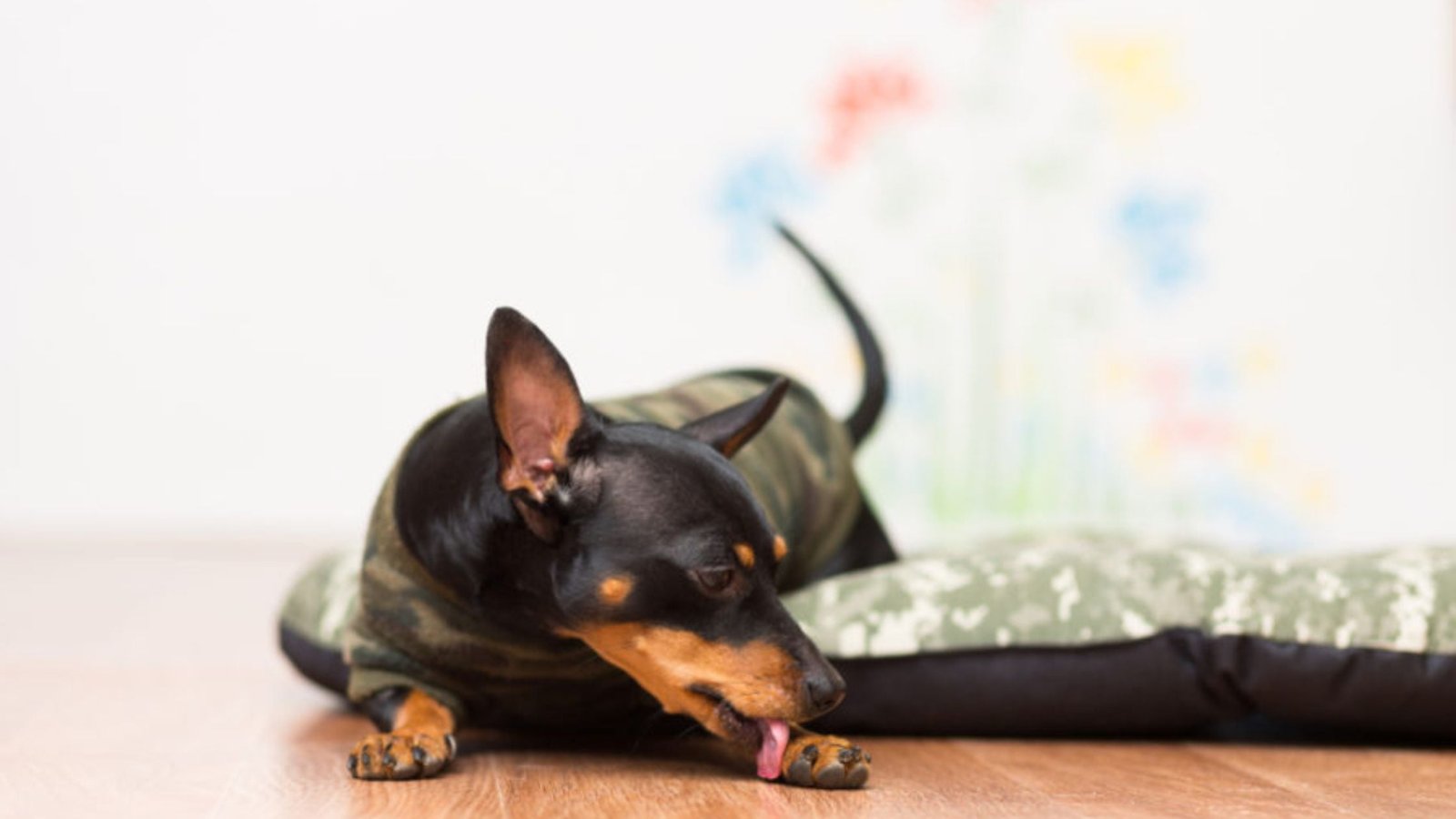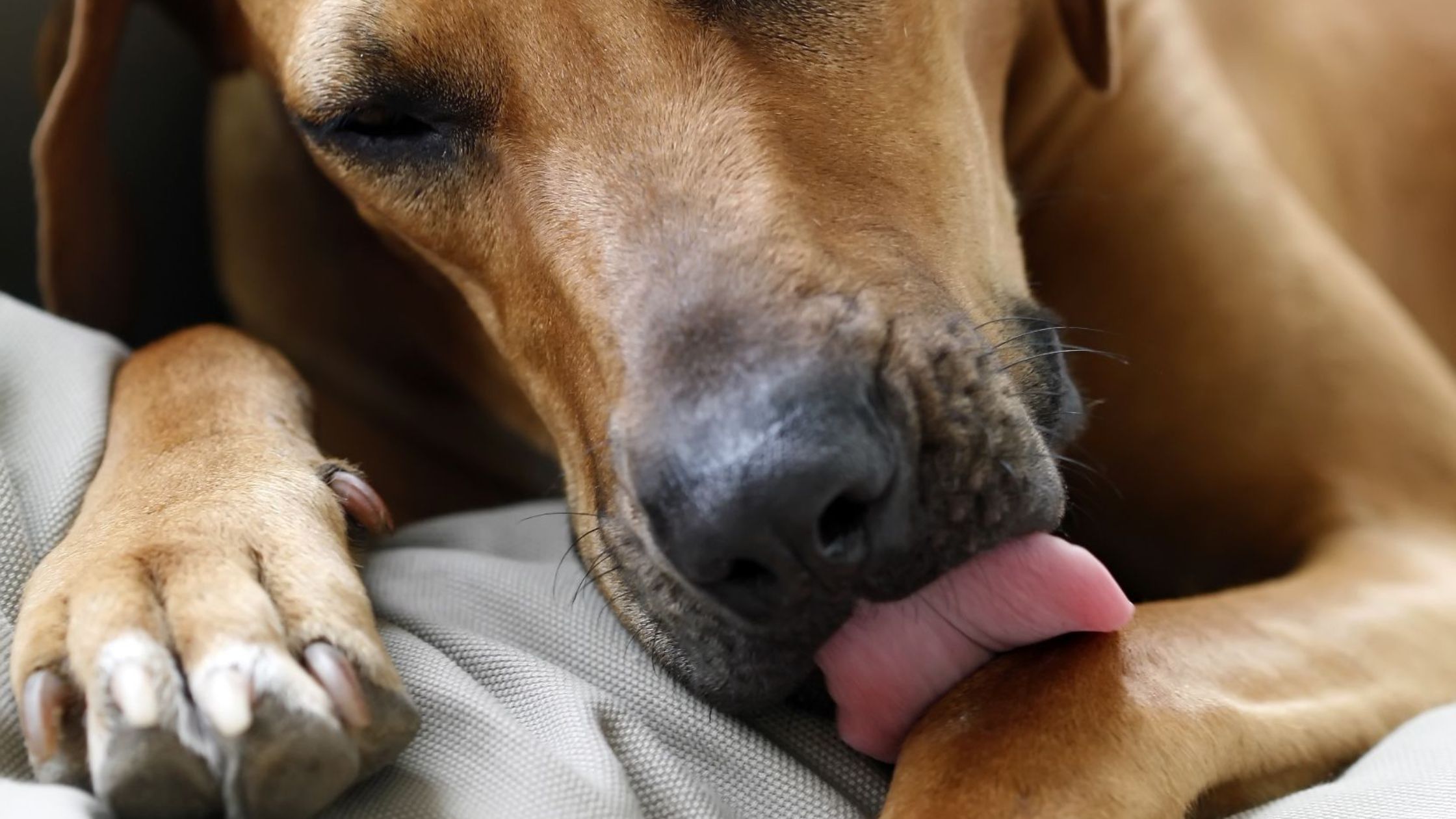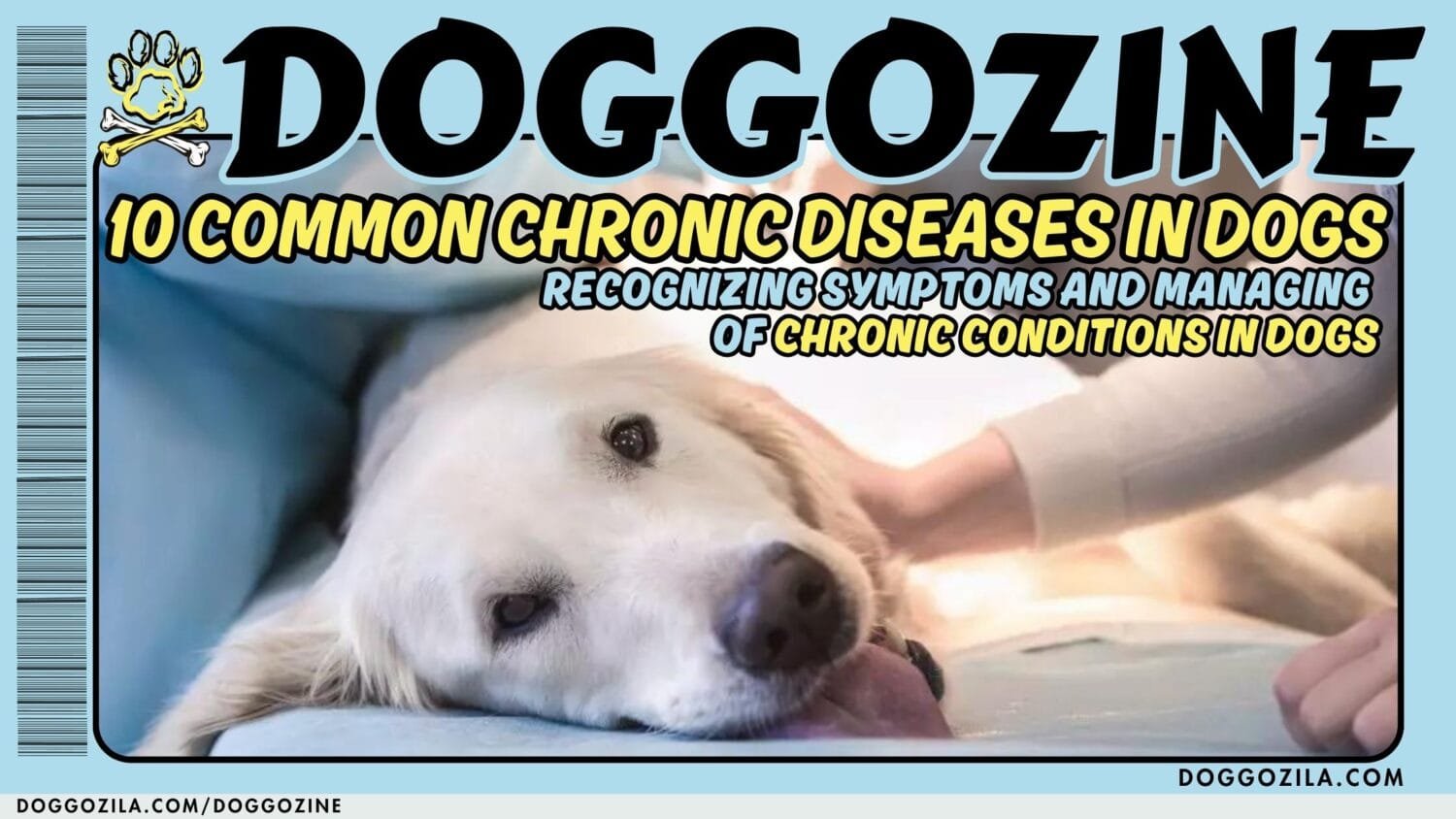The sight of your beloved dogs incessantly licking their paws can be a puzzling and concerning behavior for pet owners. While occasional paw licking is normal, persistent or excessive licking may indicate an underlying issue that requires attention. So why is your dog licking his paws?

In this exploration, we delve into the various reasons why dogs engage in paw licking, examining both common and less-known factors. From allergies to behavioral cues, we aim to provide a thorough understanding to help you decipher the mystery behind your dog’s paw-licking behavior.
MOST COMMON REASONS WHY YOUR DOG IS LICKING HIS PAWS
As a pet owner, it can be disconcerting to witness your beloved dog constantly licking their paws. While occasional paw licking is normal, persistent or excessive licking may indicate an underlying issue that requires attention. Let’s delve into the various reasons why dogs engage in paw licking, examining both common and less-known factors. From allergies to behavioral cues, we aim to provide a thorough understanding to help you decipher the mystery behind your dog’s paw-licking behavior.
Dog Allergies
Allergies are very common causes of excessive paw licking in dogs. Just like humans, dogs can develop allergies to various substances such as pollen, dust mites, certain foods, or even certain materials they come into contact with. When a dog is allergic to something, their immune system overreacts, leading to itching and discomfort. Dogs often try to alleviate this discomfort by licking or chewing on their paws.
If you suspect that your dog’s paw licking is due to allergies, it is important to consult with your veterinarian. They can perform tests to identify the specific allergens affecting your dog and recommend appropriate treatment options. This may include medications to manage the symptoms or dietary changes to eliminate potential allergens from their diet.
Dog’s Skin Infections
Another common cause of paw licking in dogs is skin infections. Bacterial or fungal infections can occur on the paws, leading to itchiness and discomfort. Dogs may lick their paws excessively in an attempt to soothe the irritation caused by these infections. If you notice redness, swelling, or a foul odor coming from your dog’s paws, it is crucial to seek veterinary attention. Your veterinarian can diagnose and treat the underlying infection, which may involve the use of topical or oral medications.
Dogs with Dry Skin
Just like humans, dogs can experience dry skin. This can be caused by factors such as low humidity, harsh weather conditions, or certain grooming products. Dry skin can lead to itchiness and discomfort, prompting dogs to lick their paws in an effort to find relief. To alleviate your dog’s dry skin, ensure that they are adequately hydrated and provide a balanced diet rich in essential fatty acids. Additionally, using moisturizing products specifically formulated for dogs can help restore moisture to their skin and reduce the need for excessive paw licking.
Dogs with Anxiety and Stress
Dogs are highly sensitive creatures, and they may resort to repetitive behaviors like paw licking when they are anxious or stressed. Just like humans, dogs can experience anxiety due to various factors such as separation anxiety, changes in routine, or fear-inducing situations. If you suspect that your dog’s paw licking is a result of anxiety or stress, it is important to address the underlying cause. Providing a safe and secure environment, offering mental and physical stimulation, and using calming techniques such as desensitization and counter conditioning can help alleviate your dog’s anxiety and reduce their paw-licking behavior.
Boredom or Habit
In some cases, dogs may lick their paws out of boredom or as a learned habit. Dogs are intelligent animals that require mental and physical stimulation to prevent boredom. If they lack appropriate outlets for their energy, they may engage in repetitive behaviors such as paw licking. To combat boredom-induced paw licking, ensure that your dog receives regular exercise and mental stimulation. Provide them with interactive toys, engage in training sessions, and spend quality time together. This can help redirect their focus and discourage the habit of excessive paw licking.
Injury or Pain
If your dog suddenly starts licking their paws excessively, it could be a sign of an injury or pain. Dogs may lick their paws to soothe discomfort caused by cuts, abrasions, or foreign objects embedded in their paws. Inspect your dog’s paws carefully for any visible signs of injury, such as bleeding, swelling, or limping. If you notice any abnormalities or suspect an underlying injury, it is crucial to seek veterinary attention. Your veterinarian can assess the situation and provide appropriate treatment to relieve your dog’s pain.
Understanding why your dog is licking their paws is essential for their overall well-being. While occasional paw licking is normal, persistent or excessive licking may indicate an underlying issue that requires attention. By considering factors such as allergies, skin infections, dry skin, anxiety, boredom, and injury, you can better decipher the mystery behind your dog’s paw-licking behavior. Remember, if you are ever unsure or concerned about your dog’s paw licking, it is always best to consult with your veterinarian for proper diagnosis and treatment.

IMPLEMENTING SOLUTIONS FOR YOUR DOG TO STOP LICKING HIS PAWS
One common issue that many dogs face is paw-related problems. These can range from minor irritations to more serious infections. Fortunately, there are several solutions and preventive measures that can be implemented to ensure the overall health and well-being of our dogs’ paws.
Grooming and Hygiene Practices
Maintaining a regular grooming routine and keeping your dog’s paws clean can prevent a variety of issues, including irritations and infections. Proper grooming techniques and hygiene practices are essential for supporting overall paw health. Start by regularly inspecting your dog’s paws for any signs of redness, swelling, or cuts. Gently clean your dog’s paws with a mild, pet-safe cleanser and warm water.
Be sure to dry them thoroughly to prevent moisture buildup, which can lead to fungal or bacterial infections. Regular nail trimming is also crucial for paw health. Overgrown nails can cause discomfort and affect your dog’s gait. If you’re not comfortable trimming your dog’s nails yourself, consider seeking professional help from a groomer or veterinarian. In addition to regular grooming, there are a few other hygiene practices that can help maintain the health of your dog’s paws.
One is to keep the hair between the paw pads trimmed. This prevents matting and reduces the risk of foreign objects getting stuck, which can cause irritation or injury. Another practice is to regularly check and clean between the paw pads, as dirt and debris can accumulate in these areas. Consistent grooming routines contribute to the prevention of paw-related problems. By keeping your dog’s paws clean and well-maintained, you can minimize the risk of infections and irritations.
Professional Veterinary Evaluation
When in doubt about the cause of your dog’s paw licking or any other paw-related issue, seeking professional veterinary evaluation is crucial. Veterinarians have the expertise and knowledge to conduct thorough examinations, tests, and diagnostics to ensure accurate diagnosis and tailored treatment plans.
During a veterinary evaluation, the veterinarian will examine your dog’s paws for any signs of infection, inflammation, or injury. They may also take samples for further analysis if necessary.
These tests can help identify the underlying cause of the problem and determine the most appropriate treatment. It’s important to provide your veterinarian with a detailed history of your dog’s symptoms and any changes in behavior or environment. This information can help them make a more accurate diagnosis and develop an effective treatment plan. Remember, self-diagnosis and self-medication can do more harm than good. It’s always best to consult a professional when it comes to your dog’s health.

PREVENTIVE MEASURES IF YOUR DOG IS LICKING HIS PAWS
Prevention is key when it comes to paw-related problems in dogs. Below we will offer you some preventive measures you can take to keep your dog’s paws healthy.
Regular Paw Inspections
Make it a habit to regularly inspect your dog’s paws for any signs of redness, swelling, cuts, or foreign objects. Early detection of any issues can prevent them from escalating into more serious problems.
Proper Paw Protection
If your dog spends a lot of time outdoors or in rough terrain, consider using protective boots or paw wax to shield their paws from hot pavement, sharp objects, or harsh weather conditions. This can help prevent injuries and irritations.
Allergen Identification and Avoidance
Allergies can contribute to paw-related problems in dogs. If you suspect that your dog may have allergies, work with your veterinarian to identify the allergens and develop a plan to avoid them. You can recognize the signs as changes in diet, environment, or medication.
Regular Exercise and Weight Management
Regular exercise and weight management are important for overall canine health, including paw health. Maintaining a healthy weight reduces the stress on your dog’s paws and joints, decreasing the likelihood of injuries or strain.
Proper Nutrition
A balanced diet plays a vital role in your dog’s overall health, including the health of their paws. Ensure that your dog is receiving the necessary nutrients, vitamins, and minerals through a high-quality, well-balanced diet. Contact your vet to determine what could be the best diet for your dog’s specific needs.
Environmental Cleanliness
Keeping your dog’s living environment clean is crucial for preventing paw-related problems. Regularly clean and disinfect areas where your dog spends time, such as their bedding, crate, and play areas. This helps reduce the risk of infections and infestations.
Regular Veterinary Check-ups
Regular veterinary check-ups are essential for monitoring your dog’s overall health, including their paws. Your veterinarian can detect any potential issues early on and provide appropriate preventive care. By implementing these preventive measures, you can significantly reduce the risk of paw-related problems in your dog. Paw-related problems can be a source of discomfort and pain for our beloved dogs. However, by implementing proper grooming and hygiene practices, seeking professional veterinary evaluation when needed, and taking preventive measures, we can ensure the overall health and well-being of our dogs’ paws.
Remember, prevention is always better than cure, so make paw care a priority in your dog’s routine. With a little extra attention and care, you can keep your dog’s paws healthy and happy. Understanding your dog’s unique needs and behaviors fosters a strong bond between you and your canine companion. As you navigate the intricacies of paw licking, you contribute to your dog’s overall well-being, ensuring they lead a happy, comfortable, and paw-licking-free life.

HOW TO STOP YOUR DOG FROM OBSESSIVELY LICKING HIS PAWS
Obsessive paw licking in dogs can be a perplexing and concerning behavior for pet owners. While occasional paw licking is normal, excessive or obsessive licking may indicate an underlying issue that requires attention. Let’s explore further the various reasons why dogs obsessively lick their paws and provide practical solutions to help you address and curb this behavior. From identifying potential causes to implementing preventive measures, we aim to empower you with the knowledge needed to ensure your canine companion’s comfort and well-being.
Medical Issues
One of the primary reasons why dogs excessively lick their paws is due to medical issues. It’s crucial to rule out any underlying health problems before addressing the behavior.
Here are some common medical causes:
- Allergies: Dogs can develop allergies to certain foods, environmental factors, or even flea bites. These allergies can cause itching and discomfort, leading to excessive paw licking.
- Infections: Bacterial or fungal infections in the paws can cause irritation and itchiness, prompting dogs to lick their paws excessively.
- Injuries: Dogs may lick their paws excessively if they have recent cuts, fresh wounds, or foreign objects lodged between their toes. Remember that these injuries can be really painful and require veterinary attention as soon you notice them!
- Arthritis: Older dogs or those with joint problems may lick their paws due to pain or discomfort caused by arthritis.
If you suspect that a medical issue is causing your dog’s excessive paw licking, it’s crucial to consult with your veterinarian. They can perform a thorough examination, run tests if necessary, and provide appropriate treatment to address the underlying problem.
Anxiety and Stress
Just like humans, dogs can experience anxiety and stress, which can manifest in various ways, including excessive paw licking.
Here are some common triggers of anxiety and stress in dogs:
- Separation anxiety: Dogs that experience distress when left alone may resort to excessive paw licking as a coping mechanism.
- Environmental changes: Moving to a new home, the addition of a new family member, or changes in routine can cause stress in dogs, leading to obsessive paw licking.
- Thunderstorms or fireworks: Dogs that are fearful of loud noises may exhibit anxiety-related behaviors such as excessive paw licking during thunderstorms or fireworks.
To help alleviate anxiety and stress-related paw licking, it’s important to create a calm and secure environment for your dog.
Consider the following strategies:
- Establish a routine: Dogs thrive on routine, so try to maintain a consistent schedule for meals, walks, and playtime.
- Provide mental stimulation: Engage your dog in interactive toys, puzzles, or training sessions to keep their mind occupied and reduce anxiety.
- Use positive reinforcement: Reward calm and relaxed behavior with treats or praise to reinforce positive associations.
- Consider anxiety-reducing products: Consult with your veterinarian about the use of pheromone diffusers, anxiety wraps, or natural supplements that can help reduce anxiety in dogs.
Boredom and Lack of Exercise Can Make Your Dog to Obsessively Licking His Paws
When they don’t receive enough exercise or mental enrichment, they may resort to self-soothing behaviors like excessive paw licking.
Here are some tips to combat boredom and provide adequate exercise:
- Regular exercise: Make sure your dog gets enough physical activity through daily walks, playtime, or interactive games.
- Provide stimulating toys: Interactive toys, treat puzzles, and chew toys can keep your dog mentally engaged and prevent boredom.
- Enroll in training classes: Training classes not only provide mental stimulation but also strengthen the bond between you and your dog.
- Rotate toys: Introduce new toys and rotate them regularly to keep your dog’s interest and prevent boredom.
Grooming and Hygiene Can Stop Your Dog Licking His Paws
Proper grooming and hygiene play a crucial role in preventing excessive paw licking.
Check these grooming tips that we recommend to keep in mind:
- Regular nail trims: Overgrown nails can cause discomfort and lead to excessive paw licking. You should trim your dog’s nails regularly if you can do it or consult a professional groomer if you can’t.
- Keep the paws clean: Regularly clean your dog’s paws with a gentle pet-friendly wipe or warm water to remove any irritants or allergens.
- Dry the paws: After walks or outdoor activities, make sure to thoroughly dry your dog’s paws to prevent moisture buildup, which can lead to infections.
- Check for foreign objects: Inspect your dog’s paws regularly for any foreign objects like thorns, burrs, or small stones that may cause discomfort.
Behavior Modification Techniques To Stop Your Dog Licking His Paws
In addition to addressing the underlying causes, behavior modification techniques can help curb excessive paw licking.
Here are some strategies to consider:
- Redirect the behavior: Whenever you notice your dog licking his paws excessively, redirect his attention to a more appropriate behavior, such as playing with a toy or engaging in a training session.
- Use deterrents: Apply a pet-safe bitter-tasting spray or use an Elizabethan collar to prevent your dog from licking his paws.
- Positive reinforcement: Reward your dog with praise, treats, or playtime when he refrains from licking his paws excessively.
- Seek professional help: If the excessive paw licking persists or worsens despite your efforts, consider consulting with a professional dog trainer or animal behaviorist for further guidance.
A Quick Summary about Why your dog is licking his paws
Excessive paw licking in dogs can be a symptom of various underlying issues, including medical conditions, anxiety, boredom, or grooming problems. By identifying the cause and implementing appropriate solutions, you can help your dog find relief from this obsessive behavior. Remember to consult with your veterinarian for a thorough examination and guidance tailored to your dog’s specific needs. With patience, consistency, and proper care, you can help your dog overcome the urge to excessively lick his paws and ensure his overall comfort and well-being.
We recommend to read the article from American Kennel Club on this topic,
if you still have problem with your puppy!









